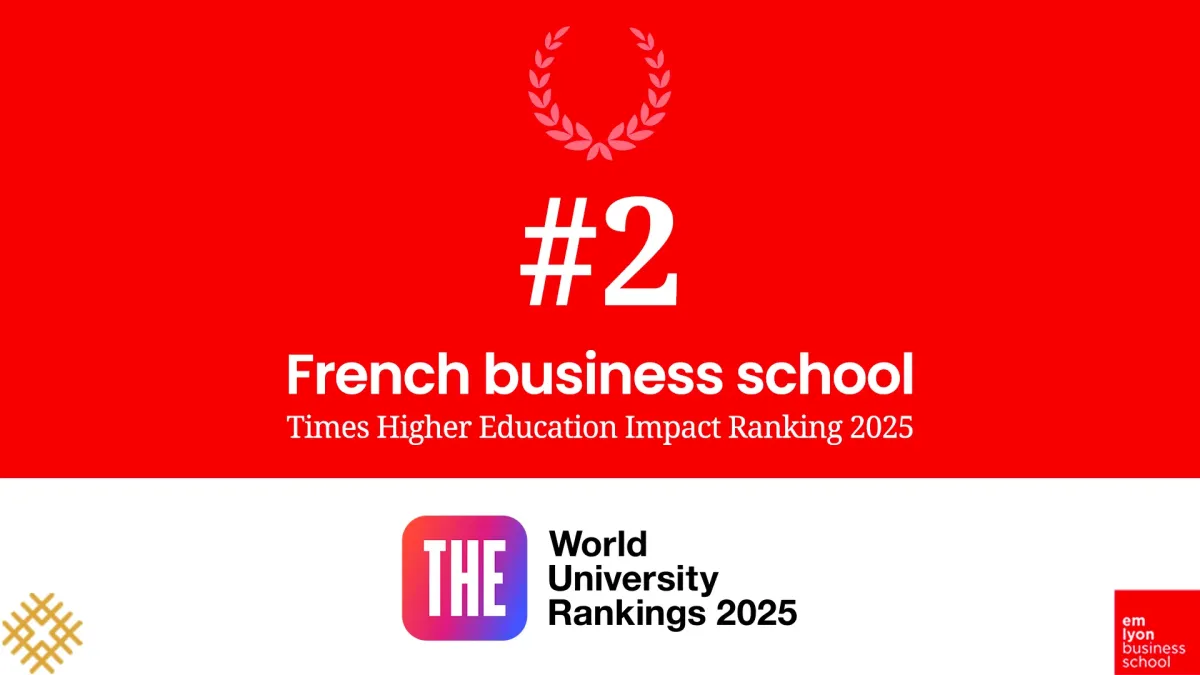THE Impact Rankings 2025: emlyon is ranked 2nd for its social and environmental commitment
emlyon business school is ranked 2nd among French business schools in the Times Higher Education (THE) Impact Rankings 2025, which evaluates more than 2,300 higher education institutions worldwide based on their contribution to the 17 Sustainable Development Goals (SDGs) set by the United Nations.
For the 5th year in a row, the Times Higher Education placeranked emlyon business school among the best institutions in higher education in terms of global employability: the School is top 2 of the French business schools for the second time, and remains among the world's top 40 gaining 3 ranks.
emlyon among the world’s top schools for its sustainable impact
Evaluated on six of the 17 SDGs, emlyon stands out in particular on the following two, demonstrated through diferent actions implemented in terms of teaching, research and the functioning of the institution:
SDG 12 – Ensure sustainable consumption and production patterns: 1st place
Responsible Purchasing Policy: implementation of a policy integrating social and environmental responsibility criteria, with 20 to 30% of CSR criteria in the evaluation of calls for tenders and a charter for a responsible supplier relationship.
Waste Management and Plastic Use Reduction: adoption of a waste sorting policy and an efficient recycling system, as well as a "zero single-use cup" policy with distribution of zero waste kits to students.
Awareness and Community Engagement: Regular organization of awareness campaigns and educational events.
Publication of non-financial reports: signature of a declaration of non-financial performance (DPEF) and a report of the engagement committee, both audited.
SDG 17 – Strengthen partnerships for the goals: 2nd place
Integration of the SDGs in the syllabi: revision of all courses using the "SDGs Inside" methodology.
SDG publications: Regular reporting on progress towards the SDGs (Global Compact Communication on Engagement).
Involvement in institutional networks and collaborations: CGE, CDEFM, CEFDG
Community Engagement: Support for 100 associations as part of the Responsible Engagement Program.
emlyon is also ranked 3rd in the THE ranking in the following SDGs:
SDG 7 – Ensure access to affordable, reliable, sustainable and modern energy for all
SDG 8 – Promote sustained, inclusive and sustainable economic growth, full and productive employment and decent work for all
SDG 10 – Reduce inequalities between and within countries
SDG 13 – Take urgent action to combat climate change and its impacts

This assessment by Times Higher Education highlights emlyon's deep-rooted commitment to social and environmental responsibility (CSR), as well as the School's very high level of involvement among the six French business schools ranked, reflecting its international recognition.
This performance reinforces the international recognition of emlyon’s social and environmental commitment. Whether it is the governance of the School, the Faculty and Research or the alumni, the students, our entire is united in striving for a fairer, more inclusive and sustainable society.
A commitment aligned with the Sustainable Development Goals
emlyon’s recognition in the 2025 THE Impact Rankings reflects not only specific actions, but a structural ambition embedded across all areas of the School. This commitment acts as a guiding principle running through all of emlyon’s activities: teaching, research, student life, partnerships, and operations.
It is part of the legal statutes of emlyon, which became a Mission-Driven Company in 2021, affirming its desire to align its activities with a purpose: to train and support enlightened people throughout their lives who effectively transform organizations for a fairer, more united society that respects the planet.
This global commitment is based on the UN SDG framework, now a key reference point for emlyon’s priorities. It comes to life through dedicated initiatives such as the school’s in-takes. To deepen its approach, emlyon has also redesigned its teaching model, by systematically integrating the SDGs into its programs through the “SDGs Inside”. On the other hand, two dedicated Master of Science programs also embody its CSR dynamic: the MSc Management of Energy Transitions and the MSc Leading Sustainable Transformations.